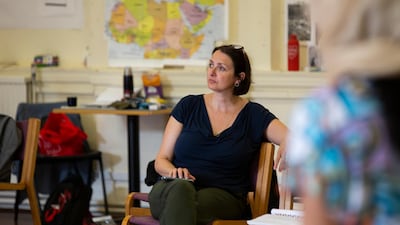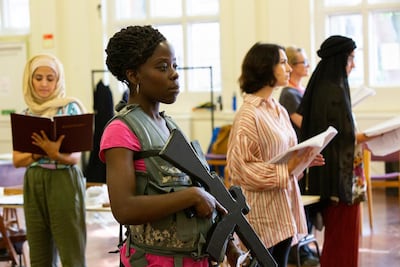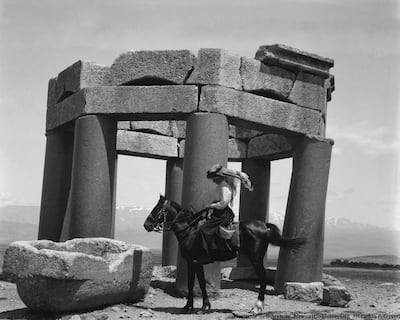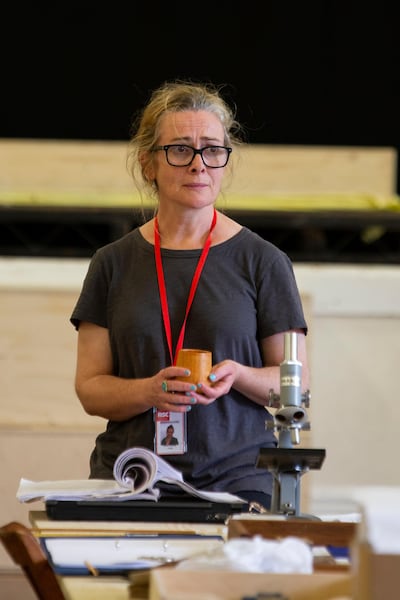In 2008, Hannah Khalil ducked into the National Portrait Gallery in London to visit the cafe, which has a beautiful view. It was only by chance that she walked through an exhibition devoted to Victorian women and that an image caught her eye: that of Gertrude Bell, a British Arabist and explorer.
“I just thought: ‘I don’t know who that is,’” Khalil says.
The Irish-Palestinian playwright, whose previous works include The Scar Test, about female detention in Britain, was amazed by Bell's extensive travels through the Middle East, in which she learnt to speak several languages and founded Baghdad Antiquities Museum, which became the National Museum of Iraq. A decade later, Khalil's play, based on the explorer and her work, A Museum in Baghdad, is being staged by the Royal Shakespeare Company. It opens at Stratford-upon-Avon's Swan Theatre on Friday, October 11, for a three-month run.
While Bell was a trailblazer, eschewing comfortable Victorian society to mount perilous expeditions across much of modern-day Syria and Iraq, ingratiating herself into various tribes and overseeing archeological discoveries, Khalil doesn’t see her as a rebel. She summed up her approach by writing this line: “The only way to change things … is to hide in plain sight. Fit in to the structures that exist.”
What began as a pure Bell biopic took a dramatic turn years ago when Khalil attended a talk arranged by the Arab British Centre in London featuring the late Lamia Al Ghailani. The Baghdad-born archaeologist was a central force in reviving Bell's museum after it was looted during the Gulf War.
“She went through lots of images of looted objects – she showed us some that had been destroyed, some that had been returned – and I was completely blown away,” Khalil recalls. “And then she ended with a slide, an image of a man, and she said ‘this is the caretaker of the museum. I always end my talks with an image of him because it feels like he has always been there and he will always be there’.”
Khalil had a light bulb moment: her play was about the Iraq museum, not Bell. She created a fictional character loosely based on Al Ghailani named Ghalia Hussein, also an Iraqi archaeologist, who leaves in the 1990s for Britain and returns to help after the war.
As for Bell, played by the British actress Emma Fielding, Khalil would focus on her efforts to open the museum during Iraq’s infancy in 1926, the year of her death. By condensing the decades between the two women, Khalil illustrates that what they seek is the same: unity and nationhood, a sense of renewal through the museum and its treasures and an answer to the lingering question “where is home”? Ghalia “has the same sort of quandary that Gertrude had”, Khalil says. “She very much feels like she loves Iraq and belongs there, but very much feels close to her family in the UK.”
Ghalia, played by British actress Rendah Heywood, also has her authenticity and motives called into question by other Iraqis when she returns, a situation with which Khalil is all too familiar. "Because I'm mixed heritage, I'm never Palestinian enough for everybody," says Khalil, who spent her childhood in Dubai. She also likes to undercut what a white western audience expects to see when watching an Arab production – the ensemble features a demure woman of colour as an American soldier and a hijab-wearing Iraqi woman who is the opposite of the meek and subservient stereotype.
“She is really feisty,” Khalil says, “much more recognisable in women in my family and women in my life.”
When Khalil started her research, she wanted to dislike Bell, who was overshadowed in history by her contemporary, T E Lawrence, and overlooked by '70s feminists, perhaps because of her anti-suffrage stance. That was because "she's a colonialist who went into the Middle East and drew up lines", Khalil says. But a closer look at the vast archive of letters and diaries that Bell left behind demonstrates not only her depth of knowledge and advocacy for the tribes she learnt to communicate with, but the complexity of the overall situation. "She wasn't a blow-in," says Khalil. "She wasn't someone who turned up and then, when it didn't work, went away again."
At one point several years ago, when she was still in the midst of writing, Khalil learnt that not one but two biopics of Bell's life were planned – one to be directed by Werner Herzog and the other by Ridley Scott. "I was dispirited because I thought it would be really great if [mine] were to come out then," she recalls. "But the older I get, the more I believe everything finds its moment."
Now feels like a perfect one: Erica Whyman, who directs A Museum in Baghdad, is also the company's deputy artistic director and curated the coming season. Her other choices are Shakespeare's King John and Juliet Gilkes Romero's The Whip, which examines the UK's abolition of the slave trade. It's the first time the RSC has put on two new plays in one season both by women from ethnic minority backgounds. Khalil, who has a tendency to explore her fascination with cultural identity through her work, finds it fitting.
“The whole season is about what makes a nation and how do we make a nation,” she says, “and what brings us together and what divides us. And at this particular political moment, it couldn’t be more prescient.”
A Museum in Baghdad by Hannah Khalil and directed by Erica Whyman runs at the Swan Theatre, Stratford-upon-Avon, England, from Friday, October 11 to January 25, 2020. Details at rsc.org.uk




